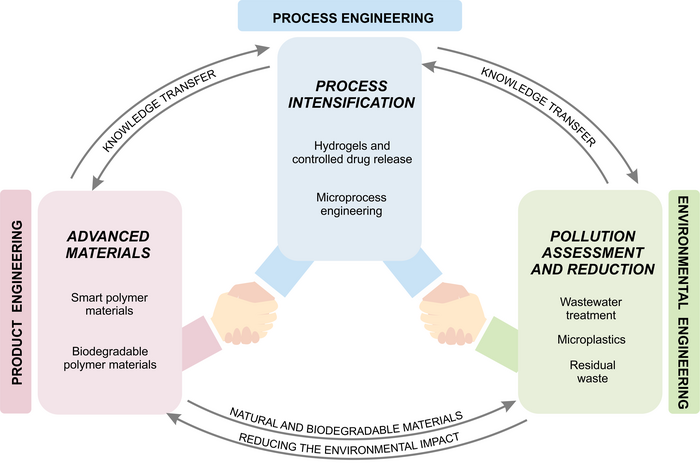Chemical Engineering
P2-0191
Duration: 1.1.2020 - 31.12.2027

The Chemical Engineering Research Programme P2-0191 is designed to work along the lines of sustainable development and the circular economy, particularly in the chemical industry. The research approach is focused on safe, material and energy efficient processes and technologies and directly follows the Smart Specialisation Strategy of the Republic of Slovenia. The research is oriented towards a holistic approach to the process from raw material to final product and builds on the broader integration of the individual research pillars of the programme group. The common denominator of the programme group is the tendency to intensify processes and reduce the environmental impact of the chemical and related industries, taking into account the social and socio-economic changes of modern society. The research is divided into three research pillars: i) Process intensification, which is the basis for research on transport phenomena and kinetic processes from the molecular to the macroscopic level, with the aim of reducing the consumption of natural raw materials and energy, pollution and/or obtaining improved product (material) structure and properties; ii) Advanced materials, where the development focuses on the use of natural raw materials for the development of new smart polymeric materials; and iii) Pollution assessment and prevention. All three pillars of research are inextricably intertwined and together contribute to a comprehensive solution to the challenges of modern society. The overall objective of the P2-0191 research programme is to develop and disseminate new knowledge and research approaches with a significant impact on the development of chemical engineering sciences, the professional and higher education, and to create viable opportunities for economic and social development. The proposed programme comprises interlinked research pillars with promising research concepts such as: controlled release of active substances from hydrogels, microprocesses technology, smart and biodegradable materials, (nano)composites, use of renewable resources, reduction of microplastics emission and impact, removal of emerging pollutants and bioremediation techniques.
Controlled release of active substances is a hot topic of current research in chemical technology, product engineering, materials engineering, nanotechnology and biomedicine. A major challenge is the development of pH-responsive hydrogels that can deliver an active substance (potentially two or more) in unchanged form to a target site, followed by controlled release upon pH change. This research has important implications for clarifying the relationship between the characterisation of the hydrogel network and the actual release efficiency and kinetics of the active substance. Further research is being directed towards the preparation of hydrogels in tissue engineering.
Microprocess engineering research includes microfabrication and micro-processing as well as fundamental research in biophysics, chemistry and microbiology using microfluidics. At the same time, accelerated knowledge transfer to biotechnological applications, chemical and pharmaceutical production, biomedicine, food quality and environmental protection is foreseen. Research areas include: transport phenomena and mathematical modelling of processes in microfluidic devices, the development of organosynthetic and biocatalytic processes using microfluidic devices for the production of high value-added chemicals and active pharmaceutical ingredients, as well as downstream processes and process integration using microfluidic systems. The development of more accurate mathematical descriptions of the processes occurring in microprocessing plants provides an excellent basis for further process intensification.
Advanced materials, together with nanotechnology, represent one of the priority research areas of the European Research Council and are part of the strategy to develop a low-carbon society and long-term climate sustainability. Research focuses on the synthesis and preparation of smart materials with self-healing (SH) and shape memory (SM) capabilities, with an emphasis on understanding their physical and chemical mechanisms. By understanding the background of both processes, the chemical composition of the materials and the thermomechanical properties linked to the material structure can be tailored accordingly to the desired SH and/or SM properties. The results allow for the dissemination of the knowledge and approaches gained in the research field of SMASH and other advanced materials and nanocomposites. The proposed research stimulates the development of smart materials in the field of bio-based and biodegradable materials.
An important part of the research is the development of new methods for wastewater treatment and the optimisation of existing methods, in line with the EU Water Framework Directive (WFD 2000/60/EC). The research focuses on "new" critical pollutants (CECs), which opens up new possibilities for the application of advanced technologies leading to technological developments in existing wastewater treatment and waste management systems. In this context, a large part of the focus is on the identification and evaluation of the microplastics hazard, which has been identified as an environmental problem by the European Commission in 2018.